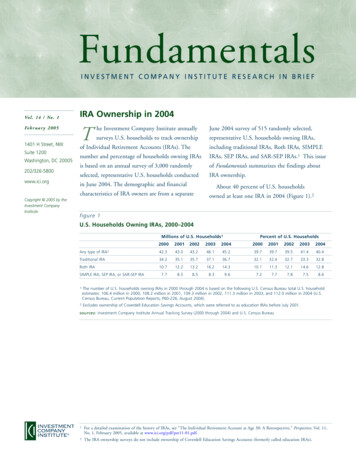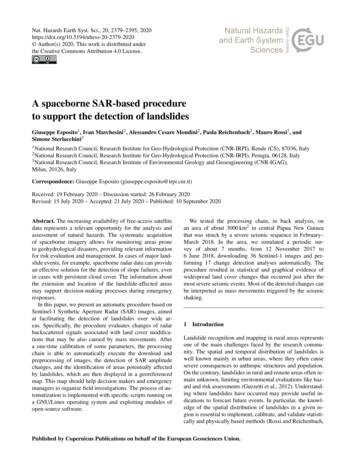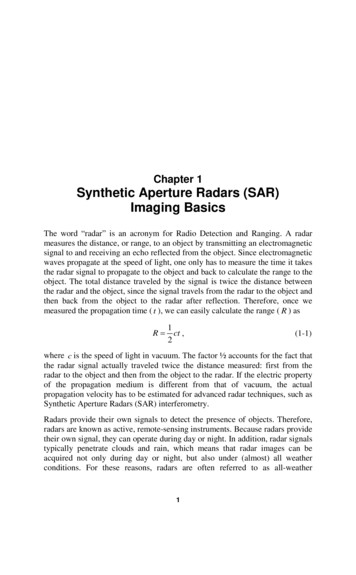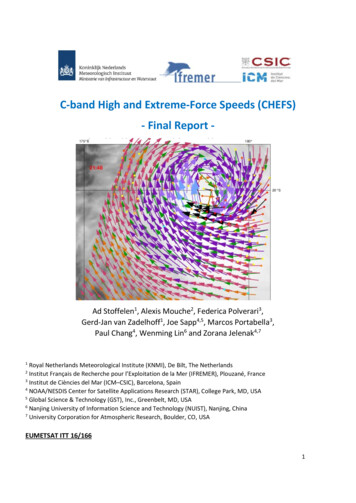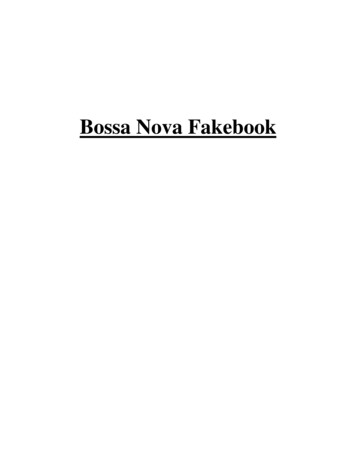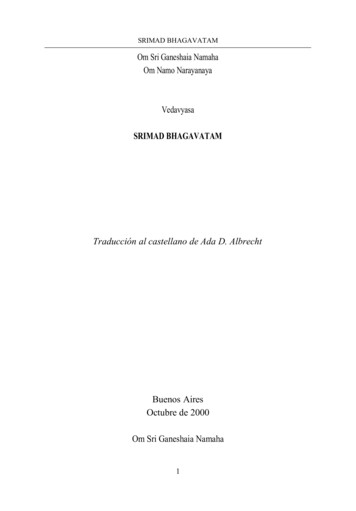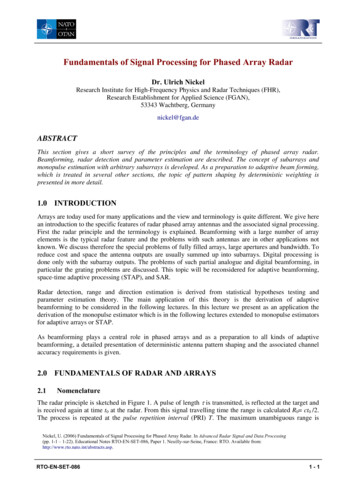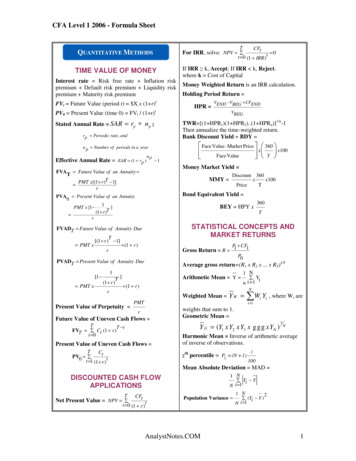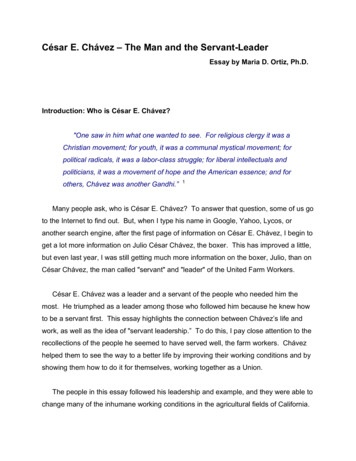
Transcription
César E. Chávez – The Man and the Servant-LeaderEssay by Maria D. Ortiz, Ph.D.Introduction: Who is César E. Chávez?"One saw in him what one wanted to see. For religious clergy it was aChristian movement; for youth, it was a communal mystical movement; forpolitical radicals, it was a labor-class struggle; for liberal intellectuals andpoliticians, it was a movement of hope and the American essence; and forothers, Chávez was another Gandhi.”1Many people ask, who is César E. Chávez? To answer that question, some of us goto the Internet to find out. But, when I type his name in Google, Yahoo, Lycos, oranother search engine, after the first page of information on César E. Chávez, I begin toget a lot more information on Julio César Chávez, the boxer. This has improved a little,but even last year, I was still getting much more information on the boxer, Julio, than onCésar Chávez, the man called "servant" and "leader" of the United Farm Workers.César E. Chávez was a leader and a servant of the people who needed him themost. He triumphed as a leader among those who followed him because he knew howto be a servant first. This essay highlights the connection between Chávez’s life andwork, as well as the idea of "servant leadership.” To do this, I pay close attention to therecollections of the people he seemed to have served well, the farm workers. Chávezhelped them to see the way to a better life by improving their working conditions and byshowing them how to do it for themselves, working together as a Union.The people in this essay followed his leadership and example, and they were able tochange many of the inhumane working conditions in the agricultural fields of California.
Their memories of him underscore a passion for service and work for a better life.César E. Chávez’s leadership had a purpose – to serve and create a community ofservice that would enhance the lives of all those who saw his example. He was ahumble man, but his words were more powerful because he supported them withactions, and people understood.The Servant-Leader According to the World of Business OrganizationsThe idea of "servant-leader" was developed by Mr. Robert K. Greenleaf in 1968. Ina 1970 essay entitled "The Servant as Leader" 2, he recounts the way in which hethought of the term "Servant-Leadership." Mr. Greenleaf recalls reading the novelJourney to the East by Herman Hess. In this fictional account, Leo, the servant of agroup of men in a mythical journey, is the central figure performing menial tasks whilesustaining the group with his spiritual presence. Greenleaf's interpretation leads to theconclusion that "a great leader is seen as a servant first, and that simple fact is the keyto his greatness.”3This idea is now guiding the efforts of many people working with business andinternational organizations to see that they serve societies of the world, and not justtheir own financial or political interests. The work of Mr. Greenleaf was very importantto business organizations because it gave them guidance on how to be more humanewhile conducting their business. However, the idea of "Servant-Leadership" was notnew. Many people have lived their lives as servants to others before they were leadersto them. The life of César E. Chávez is a good example of that idea.
How was Chávez a Servant?Poster courtesy of United Farm Workers(This statement by César Chávez was read to nearly 8,000 farm workersgathered in Delano on Sunday, March 10,1968 to break bread with theirleader after a 25-day fast for nonviolence).I read his words and I am reminded that there are still many people who lived nearhim and worked with him on this struggle for justice. Some of these people, many ofwhom were farm workers themselves, knew him and remember him well. Mr. PaulinoPacheco, for example, was one who knew and worked with Chávez since 1969. Heremembers him this way:"He came from a peasant family. His grandfather was apeasant; came from Mexico when he was two years old. His fatherwas also a peasant. So, he knew the life of a peasant. He knewwhat it is like. He knew the suffering and enslavement ofpeasantry. When we were struggling, his message was 'We fight
together. We fight for a cause and we do not use violence.' And sowe stay together and fight for our cause, for our race, and for ourrights. We stick together for justice.”4César E. Chávez began his work in his childhood, with the people he encounteredas they toiled side by side in the fields of California. He knew from personal experiencewhat it meant to be a servant and what a servant needed to do for those he wouldserve. More importantly, he knew what he did not need, in a material sense, to lead adecent life while in the service of others. One of his bodyguards, Alfred Athie,remembers when asked if he thought César had a lot of power:"I don't think it was power. He didn't like power. I don't think he everused power. For that reason, we sought him. He searched for somethingthat occupied him. What we felt, all the people felt helping people,seeking justice.”5Then, Athie adds, when asked, "What was César Chávez searching for?"" He never looked for anything for himself. He could see he hadbeen a part of this class of people. He had grown up in the fields; andhow many things and how many provisions had been in the life of hisparents, his brothers, and family. I think this is what made him see, withcompassion, the necessities. He wasn't searching for power, but forsolutions; seeking a way of living with people, with the worker, with theowners of the lands.”6César devoted his life to carving out justice for farm workers out of long and gruelingnegotiations with growers. One of the important things that Chávez tried to change wasthe use of pesticides. He alerted the public to the dangers of pesticides. He andDolores Huerta spoke early and without compromise about the dangers of pesticides inthe fields and in our food.7 Those who have recorded the history of these negotiations
tell us that, because toxic pesticide use was always a major concern of Chávez, the firstunion contracts with Delano-area table grape growers contained strong pesticideprotections for farm workers. These early contracts included a prohibition on the use ofDDT, Aldrin, Dieldrin, and Parathion on union ranches. 8César saw the need to change as the UFW grew. In his own words, he describesthis experience to Professor Richard Griswold Del Castillo: "The world was reallychanging. Now we had to start planning. We had to talk about restructuring the union.We had to look at what we were doing.” 9Those who worked with him tell us that one of the things they learned from him washow to serve others. The people that worked with him were volunteers. They alsolearned how to be organizers and union leaders. However, becoming organizers andleaders was secondary to being servants. For example, Mr. Raúl Ceja, a Labor Leaderand Organizer with the United Farm Workers, states:" And when I say, strive to help people, he educated us in thesense that you don't do it for profit, you don't do it for self gain, you do itbecause there's a need to do it. And people need to have somebodythere to help them you know ‘walk that walk.’ He never got money, henever got riches or anything like that, and most of us do the same thingnow, following through with his legacy doing what he did, without pay. I doit today." 10César E. Chávez, as man of peace, was also a mediating force between opposinggroups: those who led peaceful demonstrations, and those who believed it wasnecessary to show force in the struggle to overcome political and economic injustice.Even when it was necessary for him to have personal protection because of seriousthreats to his life, he did so in ways that would prevent violence. He requested, forexample, that his bodyguards carry no guns. He studied Eastern philosophies, readabout Gandhi and his accomplishments in India; he learned about economics, political
strategies, and management. But, without his direct experience in the fields as aservant to others, he could not have understood the practical implications of leadingothers in the creation of social change.Photograph courtesy of United Farm WorkersHow was César E. Chávez a Leader?"Leadership was bestowed on a man who was by nature a servant. It wassomething given, or assumed, that could be taken away. His servant nature wasthe real man, not bestowed, not assumed, and not to be taken away. He was aservant first.”11The passage above suggests that leadership is something the leader receives fromthe people that can be taken away. People follow the one they call leader because of
the service nature of this leader. There are two concepts in connection with the mainconcept of "Servant-Leader." One is the "visionary" part, and the second is an"implementation" part. The first has to do with determining, or knowing, what to do ina given situation. In other words, "doing the right thing.” The second is about "doingthings right." The success of a leader depends on the ability to understand how thesetwo concepts interconnect with the lives of the people the leader wants to serve. Forexample, what are the things the leader has to do for the people because they reallyneed it, and how can these things be done in a way that works well.If we look at these two aspects of his life and work, it seems that César E. Chávezknew well what the right thing was to do and how to do it well, even in the most unusualof circumstances. For example, the following passage illustrates how he responded tosituations that were abundant in tragedy, and complicated with the undertones of apolitical struggle."I called César and told him one of our members had died. Césarasked how old he was, because the death benefit depended upon his age.I told him he was thirty-years-old. César said his benefit would be 1000.César asked where his family lived and I told him he had only his mother.César said to bring his mother and we would have a fiesta to raise moneyto help her out with the funeral expenses. César said to call thenewspapers, make up a HUGE check and hold it up in front of thetelevision. We had the fiesta and gave his mother the check so she couldreturn home. We had a lawyer there to make sure it was all in properorder. It was all taken care of. Two weeks later, he called me and askedhow things were going. I told him that there was a long line of peoplewaiting to join and César said, didn't I tell you that there would be amiracle. People were joining the union.”12This passage shows how Chávez recognized three clear needs in the situation.Each one of these needs required a different response. First, at the human level, there
was tragedy, sorrow, and financial hardship. Second, at the community level, the Unionwas in need to come together to strengthen each other in cooperation and celebration.Finally, at the political level, there was a need to advance the goal of increasing theUnion's membership. César knew the people in this area did not know of the benefits ofbecoming a member of the Union. His response to this situation addressed each one ofthese needs.The deceased, in this example, was a single young man killed in a car accident. Hewas a farm worker and a member of the Union, in a location where efforts to gain newmembers had been exhausting. The local union organizer and recruiter wasdemoralized and in need of direction following the death. César’s responseacknowledges the relationship between the individual and the institution. Césarprovides the direction for specific appropriate action. Thus, knowing what to do, anddoing it right.Ms. Maria Baca was one who followed César’s leadership. As a farm worker,mother, and a housewife, she knew and worked with him. She reflects on hisleadership:"We are trying to teach our children and grandchildren that this manwas a leader. He will continue to be a leader even after he is gone. Hisname will continue to be a leader. No one else will be put in his place,because that is what he was. César was a leader. He was for educationand for the poor. He would suffer. I saw that man cry when he could nothelp these people. I saw everything. I had compassion for that man,because he was not doing it for himself, he was doing it for his people.For the children of today and tomorrow and the years to come; that washis purpose.”13Mr. Greenleaf writes that the "best test, and the most difficult to administer" rests on afew questions:
"Do those served grow as persons? Do they, while being served, become healthier, wiser, freer, moreautonomous, more likely themselves to become servants? What is the effect on the least privileged in society; will they benefit or,at least, not be further deprived?"These same questions we ask of managers and leaders of large businessorganizations and international corporations. Many of these business organizationsmeasure success by the amount of their profits. Today, it is very important that weconsistently ask these questions of business organizations. It is also important that weask these questions as a test for the servant-leader concept in the work of César E.Chávez. Once again, we learn the answer from the memories of the people he soughtto serve. Ms. Maria Baca tells us:" So, we went to a meeting in Santa Maria and César was there. Hesaid, "Don't worry, I’ll get you a lawyer, but you have to fight for aneducation for your children. Fight now!" When he said, ‘Fight now,’ it wasso important for us. We had never done that; our parents had neverfought for us and it was important for us to fight for our children. We arestill fighting for a better education for our children. I have gotgrandchildren now – tomorrow I might have great-grandchildren – and Iwant it to be better for them. I want something better. César gave usthat Thank God, he gave us that! He gave us a good education. Thewhole thing was not only to be a farm worker, but also to get a goodeducation. He brought us that education, and what we are learningnow.”14Because of the experiences many farm workers gained as organizers and membersof the UFW, their children had been influenced to see beyond the limitations of migrantand farm work labor; and they joined a new struggle – to obtain an education and a
different economic future. César E. Chávez gave them evidence with his actions that"Yes, it is possible" (Sí se puede) to change their working conditions.Photograph copyright Manuel EchavariaDuring the many battles and power struggles between the growers, the Teamsters,and the Farm Workers Union, César was often considered stubborn. It was in the bestinterests of the growers to control this man, and to do it by changing the balance ofpower. They thought that by doing so, he would be forced to define himself differently.Professor Jenkins, in 1985, notes that Mr. Herbert Fleming, President of the WesternGrowers Association, said, "If we could get the Teamster contract from Chávez, thenmaybe in the long run Chávez would have to shape up and act like a businessman andit would work out.” But they underestimated Chávez. Obviously, he was not going tothink "like a businessman". From his point of reference, he would think like the peoplehe chose to serve. More importantly, he would think about what would meet their mostessential needs as they performed their daily work.
Photograph copyright Manuel EchavariaAn example of this comes in the words of Mr. Paulino Pacheco:"That was the 14th of June 1969. César came to Santa Maria to visitus. Before that time, he had only been with us once before. He askedwhat is going on in Santa Maria and we told him "not much." He told ushe wanted us to put toilets in the fields and have fresh water available, sothe workers could rest and take a break. So we went to Santa Maria andstarted talking about the toilets and the people asked what we meant by"toilets." Never before have there been toilets in the fields, not even mygrandfather had toilets. We worked real hard; we called it the "ToiletRevolution." We did things peacefully, so we were able to put the toiletsup without much resistance. We were able to win that concession. Thenthe farmers put up more toilets in the fields and gave the workers freshwater. Before this, the women had to dig round holes in the ground totake care of their needs.”15
César E. Chávez was a practical and ethical man. He understood the ethicalimplications and the consequences for himself if he were to switch his "way of thinking"to be more like a businessman, as the growers would have preferred it. But, as theleader and manager of the United Farm Workers and a man who had principles, hefollowed his principles for the benefit of the organization.There seemed to have been a major misconception about him as a servant-leader.Some people confused humility of heart with ignorance. Although in his humbleappearance he might had been perceived solely as a servant, his skills as a leader andthe manager of a cause gave him the advantage over his adversaries. He acquiredthese skills through many years of defiance against the forces of oppression that soughtto destroy his true spirit and nature.The legacy of César E. Chávez teaches us about the challenges of service andleadership. It also teaches us that, while it is hard to be an effective servant-leaderbecause we are human with many frailties, we are still capable of serving people. Wecan be honest with ourselves about our limitations as human beings, and we are stillcapable of serving and leading people with a good example.Conclusion"The worst thing that I see is guys who say, 'man, they don't have anyChicanos up there [in places of power], and they're not in there working tomake sure that it happens. We [as Chicanos] criticize and separateourselves from the process of change. We've got to jump in there withboth feet to change conditions.” (Dolores Huerta) 16The life of César E. Chávez, among other things, is a guide on how to live andpractice leadership for the service of those ignored by political and economic structures.Even when criticism arose among some Chicano activists, his influence was
underscored by the unconventionality of his actions while in pursuit of social justice. 17His life was political because he spoke the unspoken; he defended the humble and thepoor, the left out. He confronted the powerful and the politically untouchable; and he didit while asserting: "Nonviolence is our strength". Professor Richard Griswold del Castillowrote the following about him:"Before Jesse Jackson said, 'Keep hope alive,' Chávez had urged it. BeforeJackson called for a Rainbow Coalition, Chávez had formed one. Before theKennedys discovered the liberal mystique of the poor and poverty, Chávez hadlived it and embraced it.”Likewise, César E. Chávez had been practicing as a Servant-Leader before the termbecame known in business practice. In his own words he reminds us:"I think most of us in the Union , we've been able to letpeople understand that leadership comes in our union not becauseyou're blonde or brown or black or white or in between. It comes ifyou can cut it, if you can do it, we do not care what color it is. Iguess you've seen the union. The best kind of Chicanismo we canhave is the kind that reaches out and embraces mankind.”Photograph copyright Jess Gutierrez
He lived within the paradox of being born a Mexican man within what some writershave described as a "very traditional" culture. But César E. Chávez conducted his lifeas a human being keenly aware of his connection to all humans regardless ofbackground, creed, personal preferences, or opinions. He lived in the paradox of the"Borderlands," so aptly described by Gloria Anzaldúa when discussing the challengefaced by those that have more than one cultural tradition. Family heritage and culturalhistory allows many of us to speak another language besides English, and to becomfortable with various customs and traditions. It gives us a unique perspective on theworld. César could have lived up to the typical stereotypes attributed to Mexican males,but he did not. His example teaches us differently. He might have been "surrounded"by stereotypes, and could have succumbed to their trappings. "Or perhaps ,” asAnzaldua comments, he could have "decided to disengage from the dominant culture,write it off altogether as a lost cause, and cross the border into a wholly new andseparate territory. Or, he could have gone "another route.” But not César. He knew ".the possibilities are numerous once we decide to act and not react.”18César E.Chávez chose to act.His joys were the simple pleasures derived from being with his children, his family,his impromptu hikes with his grandchildren in the hills near La Paz. César, the man,was humble and simple in the meaningful ways his loved ones understood. He wasguided by powerful forces. The forces that, according to Dr. Margaret Wheatley, are"the imperative to create one's self as an exploration of newness and the need to reachfor relationships with others to create systems.” 19 In his life and work, he was ahead ofhis time and part of a new story for the generations of this century searching out formeaning.César E. Chávez’s life work teaches us about our responsibility as individuals to actand create the world of justice we dream of having. In our efforts to understand theman and his life, we must stop to reflect upon our own questions and ask: What motivates us to want to know about the man and his life?
What is our responsibility as individuals in the world we have created? How can we continue the legacy to create a just society for everyone?Our questions about him might teach us more about what we do not know aboutourselves. It may be possible that the questions we have and our interest in the studyof César E. Chávez, his life and work as "servant-leader," can help us to focus on theprinciple of citizenship. Learning from César E. Chávez’ example, we can answer: Yes,it is possible (Sí se puede!). It is possible to create and articulate a vision; to beaccountable for the well-being of the whole; to set and pursue goals that sustain ourinstitutions; our families and communities; to establish boundaries and set limits; tocreate structure and order that suits our purposes and well being; and to become rolemodels. As we move on to assert our "servant-leader" role, we can begin teachingothers as Mr. Athie, advises us:"It is necessary that the students know that this story was real. In thiscountry, so powerful, so full of beauty, so large, there are also manyinjustices. We need a Chávez, many Chávezes, so that we can continuedoing good for others.”20
References1Griswold, Del Castillo, R. & Garcia, Richard A. César Chávez: A Triumph of Spirit. (pg. 105) University ofOklahoma Press, 1995.2Blachard, Ken. "Servant-Leadership Revisited", in L. C. Spears In Insights on Leadership: Service, Stewardship,Spirit, and Servant-Leadership. (pp. 21-28) John Wiley & Sons, Inc. 1998 by the Greenleaf Center.3Robert K. Greenleaf began his career at AT&T where he worked for 40 years. After his retirement as director ofmanagement research in 1964, he began a second career as an author, teacher, and consultant to businessorganizations that lasted another 25 years. He founded The Greenleaf Center for Servant-Leadership. He publishednumerous books and essays on the theme of Servant- Leadership. After his dead in 1990, his work now continuesthrough The Greenleaf Center for Servant-Leadership, a not-for-profit institution located in Indianapolis, Indiana.4Interview with Paulino Pacheco by Ruben Zepeda , August, 2001, Santa Maria, CA. California Department ofEducation César E. Chávez Web site.5Interview with Paulino Pacheco by Ruben Zepeda , August, 2001, Santa Maria, CA. California Department ofEducation César E. Chávez Web site.6Alfred Athie, 73-year-old Construction Worker and César's bodyguard. Interviewed in Spanish (Englishtranslation available), August 2001 by Ruben Zepeda. California Department of Education César E. Chávez Website.7César E. Chávez. Speech to students at San Francisco State University, San Francisco, CA March 30, 1990.8Moses, Marion. "Chapter 10 Farmworkers and Pesticides.” In Confronting Environmental Racism : Voices from theGrassroots, edited by Bullard, Robert D., 161-178. Boston, MA: South End Press, 1993.9Griswold, Del Castillo, R. & Garcia, Richard A. César Chávez: A Triumph of Spirit. (pg. 132) University ofOklahoma Press, 1995.10Griswold, Del Castillo, R. & Garcia, Richard A. César Chávez: A Triumph of Spirit. (pg. 132) University ofOklahoma Press, 1995.11Greenleaf, Robert K. "Servant-Leadership". Insights on Leadership: Service, Stewardship, Spirit, and ServantLeadership (pg. 16). John Wiley & Sons, Inc. 1998 by the Greenleaf Center.12Paulino Pacheco, Farm worker and Labor Organizer. Excerpt from oral interview, Santa Maria, CA. August 2001.California Department of Education César E. Chávez Web site.13Maria Baca, Farm Worker, mother and housewife. Excerpt from Interview in Spanish. August, 2001, Santa Maria,CA. California Department of Education César E. Chávez Web site.14Maria Baca. Excerpt from Interview in Spanish. August, 2001, Santa Maria, CA. California Department ofEducation César E. Chávez Web site.15Paulino Pacheco, Farmworker and Labor Organizer. Excerpt from oral interview by Ruben Zepeda, Santa Maria,CA. August 2001. California Department of Education César E. Chávez Web site.16Dolores Huerta, quoted in Griswold, Del Castillo, R. & Garcia, Richard A. César Chávez: A Triumph of Spirit.(pg. 73) University of Oklahoma Press, 1995.
17"Yet, the powerful reputation that Chávez acquired during two decades of organizing migrant fieldworkers is stillstrong. He is still a figure of moral authority, particularly in the Hispanic and labor communities, and over the yearshe has burnished that image by frequent exposure. He has marched with casino workers on Las Vegas picket lines,spoken on behalf of gay rights activists at Hollywood dance spots, and he has been arrested in anti-apartheiddemonstrations on campuses". Maclean's, September 9, 1985. "César Chávez Fights Again", Los Angeles Times,pg. T2 by Pam Morrison in Los Angeles.18Anzaldúa, Gloria. Borderlands: The New Mestiza (pg. 79). Aunt Lute Books, 1987.19Wheatley, Margaret. "What is Our Work" " Insights on Leadership: Service, Stewardship, Spirit, and ServantLeadership (pg. 348). John Wiley & Sons, Inc. 1998 by the Greenleaf Center.20Alfred Athie, One of César Chávez' body guards. Excerpt from oral interview, August 2001. CaliforniaDepartment of Education César E. Chávez Web site.
solutions; seeking a way of living with people, with the worker, with the owners of the lands." 6 César devoted his life to carving out justice for farm workers out of long and grueling negotiations with growers. One of the important things that Chávez tried to change was the use of pesticides. He alerted the public to the dangers of .

